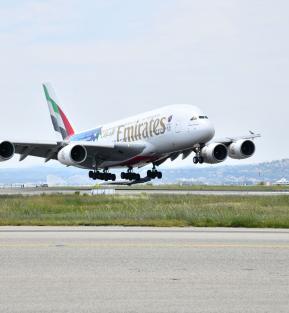The pandemic did not put a damper on Aéroports de la Côte d’Azur’s commitment to decarbonising its activities, and its investments in that area were not revised downwards despite difficult circumstances. And now that the year has come to a close, and air traffic is showing continued momentum, the Group has extended its efforts in three key areas.
First, decarbonisation of the air transport sector itself. An Airbus A380, with support from the French air traffic control agency, made its first full-scale test from the Nice-based hub of an LTO (landing and take-off) cycle conducted 100% with biofuel on one of its engines. That successful experiment is part of a wider drive to write the next chapter in the history of the air transport sector, which is committed to cutting its emissions, bearing in mind that the LTO cycle is the flight phase with the strongest environmental impact for the region.
Next, reducing its energy consumption. The first step was to connect Terminal 1 to the neighbouring water treatment plant in order to recover unavoidable energy from the city’s wastewater. This original innovation provides heating for the terminal and does away with the need for an oil-fired boiler. For the region, that means an instant saving of 700 metric tons of CO2 per year.
Use less, waste less
As well as doing away with fuel, the Group has pledged to reduce its electricity consumption, which is already 100% French-origin and from renewable sources. In response to calls from the Government and its region, it drew up an energy sobriety plan back in October, reducing its annual consumption by 10%. To go even further, the Group has also agreed to install solar panels at its Nice and Cannes-Mandelieu hubs, and plans to build a solar farm with a capacity of 6 GWh for its Golfe de Saint-Tropez hub, which will then be a net producer of decarbonised energy for its region. Reducing the Group’s environmental footprint also means becoming more energy self-sufficient.
The third key area we are focusing on this year is reducing waste as much as possible. On the one hand, within the terminals at Nice Côte d’Azur Airport, the Group has pledged – with support from Citeo – to carry out a full review of the waste collection system, both in retail outlets and along the passenger journey, to optimise recyclability. A comprehensive awareness-raising and incentive scheme aimed at partners and passengers is being rolled out and will be definitively in place by spring 2023. On the other hand, the Group initiated and consolidated a unique long-term partnership with the charity Les Restos du Cœur. As a result, Nice Côte d’Azur Airport became the only European airport to offer passengers the option of donating the products removed from their cabin baggage to charity, rather than simply having them destroyed. In less than a year, nearly 25,000 products – food items and others – have been redistributed to beneficiaries of the charity created by the French comedian and actor Coluche.
Better connected, better served
While those actions, which are part of its regional protection strategy, were in full swing, Aéroports de la Côte d’Azur also recorded commercial aviation traffic figures for 2022 on the rise. Although they remain below 2019 levels, they reflect an upsurge that contributed to the region’s economic and cultural dynamism.
Nice Côte d’Azur Airport ended the year with a recovery rate of nearly 84% compared to 2019, i.e., 12.12 million passengers in total (arrivals and departures) for 144,843 commercial aircraft movements.
“Looking beyond the figures, we would like to focus on several highlights, such as the return of very good connectivity as shown by our dynamic network of destinations – two thirds of which are international – with a record of 9 long-haul flights, reflecting the global attractiveness of the French Riviera. Next, the successful reopening of Terminal 1 on 27 March. We pledged to ensure there were no obstacles to recovery, and that helped us better prepare for the return of high-season traffic, maintain our solid operational performance and avoid some of the problems that affected other European hubs by getting all airport stakeholders on board. That meant we were able to maintain quality of service, which remains our priority and our number one responsibility with respect to our partners and passengers,” concludes Franck Goldnadel, Chairman of the Board of Aéroports de la Côte d’Azur.
That quality of service is also the key driver of the Terminal 2 extension project, a necessary response to the risk of overload in terms of infrastructure. Approved in late 2022, work is set to begin at the start of the year, and delivery will be in two stages – the first in summer 2025 and the second the following year. This extension will enable the airport to manage traffic peaks without compromising passenger comfort, the fluidity of their journey through the terminals or flight punctuality.
In the field of general aviation, 2022 confirmed the trend observed during the pandemic, when use of private aviation helped mitigate the lack of passenger aircraft, and confirmed the need for business travellers to be able to fly quickly and efficiently across France and Europe. More resilient during the health crisis, business in 2022 helped get traffic levels back up to 2019 levels, and even slightly higher.
About Nice Côte d'Azur Airport
Nice Côte d’Azur Airport is the second-busiest airport in France after Paris. In 2021, it recorded 6.54 million passengers, in contrast to the 14.5 million passengers recorded in 2019, when the hub offered 120 direct flight destinations, operated by 57 companies, regularly travelling to and from 44 countries. Apart from Paris, it is also the only French airport to offer 9 long-haul destinations with scheduled flights to Abu Dhabi, Bahrain, Dubai, Kuwait, New York and Montreal.
www.nice.aeroport.fr - @AeroportNice
About Aéroports de la Côte d'Azur
The Aéroports de la Côte d'Azur group operates Nice Côte d'Azur Airport, the second-busiest airport hub in France, and Cannes Mandelieu and Golfe de Saint-Tropez airports. It is number 2 in Europe for business aviation. The regular helicopter connection between Nice and Monaco is the busiest in the world in terms of traffic. The Group's three airports are certified as Level 4+ Carbon Neutral by ACI, and the Group has undertaken to achieve the goal of zero CO2 emissions without compensation by 2030. Since 2016, Aéroports de la Côte d'Azur has been a private group, and the majority of its capital belongs to the Azzura consortium.
https://societe.nice.aeroport.fr/
Press Contact
Aymeric Staub – Press Officer
+33 0(7) 88 73 27 41 – +33 0(4) 93 21 30 67
+33 (0)6 38 51 75 68 (24/7)
aymeric.staub@cote-azur.aeroport.fr


